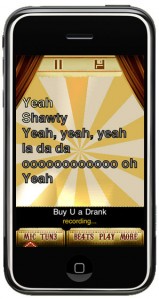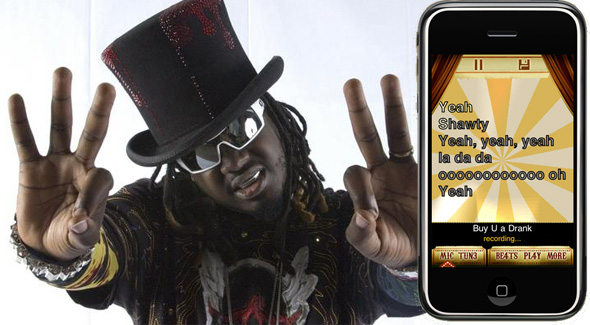The new iPhone app, “I Am T-Pain,” allows wanna-be T-Pains and Kanyes to apply a heavy Auto-tune effect to their voice and sing along to a backing track. I was about to write an analysis of this curious new form of music making when I thought, why not just sing it Auto-Tune style using the app?
Shawwwty!
Lyrics after the jump. Shawwwty!
 I’ve done some Overthinking of Auto-Tune before
I’ve done some Overthinking of Auto-Tune before
when comparing its inventor to Les Paul
And though Dr. Hildebrand and T-Pain might not be remembered as musical innovators like Les Paul,
There is no doubt that Auto-Tune is hugely influential today.
And so it’s big news when an iPhone app
comes out that promises to make you T-Pain
by integrating the auto-tune effect with some backing tracks
it allows even amateur musicians to sing like T-Pain.
But it’s very important to note that this app requires
a basic ability to sing a melody.
With the notable exception of Auto-tune the news,
Auto-tune can’t make something out of nothing.
Haters of Auto-tune may claim that this sort of app
only proves their point that Auto-tune is killing music
But I beg to differ. It can only do good
if it gets people to sing more than they normally would.
By removing barriers to making music,
Things like I Am T-Pain and Guitar Hero make music more accessible,
And that is something your violin teacher was unable to do.
So to all the haters and all the players,
I suggest you put aside your cynicism and give this a shot.
You’ll be making music, and that’s a good thing.
This has been Mark Lee for Overthinking It.
Shawwwty!

If I had an iPhone, I would’ve bought this app YESTERDAY. And I’d be using it NOW.
I don’t think I’m a hater. At worst I think you can call me a music snob which I won’t necessarily deny. But I’m sure you’ll let me know if it turns out I am. I don’t disagree with most of what you’ve written about auto-tune here or previously. It is an effect and creates an aesthetic that is commercially viable. There are performers that want to use it and listeners who want to hear it. There are a vast selection of digital tools for music production that deserve much more scorn than auto-tune since they actually strip musicians of work- such as composing programs used to write some film scores. It could come with a warning: “No Actual Musicians Were Paid in the Production of this Score.” With auto-tune, there are still good singers out there getting work but it’s widened the field to more varied performers. I realistically understand that we’re all just going to have to deal with that and become more educated consumers.
I take issue with your claim that this app (and its like) are “removing barriers” to make music “more accessible.” Or making music at all. Nuh-uh. This is a toy*, albeit a sophisticated one. As “American Idol/Got Talent/Etc” has shown us, the world is not lacking in people who want to sing all kinds of music! Whether they should or not. (I’m not exactly sure how that’s become a fine line, but anyway…) The human voice isn’t exactly falling into disuse. I must come to the defense of the teachers because music and appreciation is something that’s learned. So don’t go insulting a violin teacher- especially not by comparing them with those toys! Your violin teacher worked to instill the skills necessary to understand and create music independently, not ape it. After putting down that iPhone or Guitar controller, the player doesn’t come away with any real knowledge of how that song or general music is structured. They haven’t been given an extraordinary, new ability to communicate the music to someone or to reproduce it without pressing those big shiny buttons. (Maybe they can recreate the harmonic rhythm but I’m not betting on it.) These haven’t broken down any new barriers to making music that weren’t already done by the car radio. You’ve still got someone singing along and rhythmically thumping things. Now it’s just something other than their steering wheel.
Enjoy playing Rock Band (I do!), Guitar Hero, I-Am-T-Pain and all the rest. But don’t mistake that for making music.
*http://www.amazon.com/gp/product/images/B0000789TJ/ref=dp_otherviews_1?ie=UTF8&s=toys-and-games&img=1
@Lisa, I admit, that was a bit of a cheap shot at violin teachers, so let me elaborate on that point for a bit: like many folks, I grew up being forced to play classical music by my parents. Though I hated my cello lessons, I am definitely appreciative of both my pushy parents as well as all of my teachers who put up with my sloppy playing and general lack of preparation. Somewhere along the line, though, I taught myself how to play the guitar, and in doing so, I taught myself how to appreciate music. From there, I went on to front several rock bands and conduct ensembles ranging from church choirs to a college marching band.
My point isn’t that stuffy classical music instructors are bad people or that they’re detrimental to music development; it’s just that they have the odds stacked tremendously against them when it comes to getting young people to enjoy making music. Think about it: they’re asking kids to put out tremendous effort for very little gain. It takes months of painstaking practice to be able to eke out a simple tune on a violin, and the kid really couldn’t care less about that song.
I don’t mean to belittle all of the effort that goes into playing a violin well, but the reality is that folks are far more likely to engage in music if the barriers are low and the rewards-to-effort ratio is more favorable than that of most classical instruments. I see things like this iPhone app and Guitar Hero as gateways/stepping stones to more serious music making, not as cheap substitutes.
@lee You have a spiffy musical background. I like it. And it doesn’t really surprise me. It’s good to hear that music teachers are appreciated in the long term, if resented in the moment. I was the same as a kid (went thru violin/trumpet/piano before settling on voice and eventually teaching myself to play odd, totable instruments). I also must admit I wouldn’t have the patience to teach young ‘uns. It is largely thankless work. I harped perhaps too much on the teacher aspect. I didn’t like the comparison but no, don’t believe you were belittling them. More that you were elevating the digital too much relatively. You’re absolutely right tho- the learning curve is steep as hell. Often both the pedagogical material and methodology are archaic and single minded to the point of zealotry. But putting the entire classical aspect aside (It can be stuffy. I know. I work there.) I’m not saying everyone should study music or know theory or even has to learn about it to enjoy it! My complaint is more that- Allow me to channel my inner 80-year old as I say- I don’t like the push-button, spoon-fed simplicity which sets lower and lower expectations for people. 3-2-1-Poof and it is done and done for you, while the consumer sits there saying “Look what I did and/or made!” Well, they didn’t make anything. But prizes will keep coming out when they press the bar- a consumer who only peruses the “recommended selections” offered after they click ‘buy’ and no further.
*quietly slips the AARP card back into a pocket*
I do realize that my complaint relates to a trend that reaches far beyond this topic, but it particularly gets to me when it comes to music.
You see it as a stepping stone but I’m not that optimistic. I’m not sure I see how it engages them to participate more or in what capacity. Or let’s say they are engaged and want to pursue it further, now they’ve been given hopelessly unreal and simplified expectations of music making to go on. Overall, I see people being given less reason to know things in any depth and being given disproportionate rewards for it. Heh- I guess I’m not so much a hater, just a pessimist.
Dunno. I go back and forth on this topic. I teach music appreciation, and assign my students to speculate about Guitar-Hero-vs.-actual-instrument question, and they’re all over the map too.
An interesting meta-question would be WHY these games evince such strong reactions on both sides of the issue.
The interesting thing about autotune the degree of squawk is proportional by how off key you sing, which means that it’s not necessarily easy to reproduce that characteristic T-Painful bleat. Whenever I hear people messing around with the filter, they tend to have moments where they accidentally sing the “right” pitch, which makes the distortion disappear for a second, which sounds kind of stupid. I’ve never heard T-Pain make the same error. The ability to, on command, miss a note by *exactly* thirty cents (or whatever) must take some pretty brutal ear-training chops, no?
Lee, in response to your argument about the forces working against orchestra teachers: I think you’re forgetting how some kids *want* to play in orchestra, etc., and get classically trained. I went to a performing arts high school filled with kids in my own orchestra class (and cello section, yay cello!) that dreamed of Juliard and the Olin Conservatory and NYU- they practiced for fun, they walked around carrying and playing their instruments between classes (if they were small enough- obviously bassists and cellists couldn’t, but they made do with their bows), every music theory class was full, etc. And our orchestras, when on the road, would take the top spots in all of the competitions we entered. We weren’t good or appreciative because of the teachers, though- they barely did a damn thing. We were good because enough of the students themselves cared and wanted it. OUR orchestra teachers had it *easy*- they didn’t necessarily stand by and watch, but they rarely had to shove it down anyone’s throats all that much. Personally, I didn’t dream of Carnegie Hall, and I didn’t practice very much as a result, but (and I’m not trying to sound arrogant) I didn’t have to- I was naturally good enough to do well anyway once I had been taught the basics in middle school. As such, I and others like me, ones that didn’t make it their life but still enjoyed it enough to stay, contributed to the overall output of the groups. So my point it it depends on the students the teachers get.
And I think this applies to people playing Guitar Hero or using the autotune app. I think some people will take it more seriously and others won’t. Some people will think of it as “skill,” and others won’t. Some people will like music more, some won’t. Etc. I know the friends and relatives of mine that play Guitar Hero and similar games run the entire spectrum of music appreciation/understanding/whathaveyou, and I doubt this is an anomaly. But I think I’m with Lisa in that while I’m glad it may make things easier and thus increase the spread of music, it’s also kind of depressing because it lowers standards and expectations on output while increasing those of reward in some cases- again, not all, but some.
BUT, Stokes: If what you say is true, then I’d argue it actually *doesn’t* make it easier, but harder.
http://kottke.org/09/09/auto-tuned-toddler-sings-his-abcs
I guess the “auto-tune X” meme is going to get old fast, and faster now that the app is out.